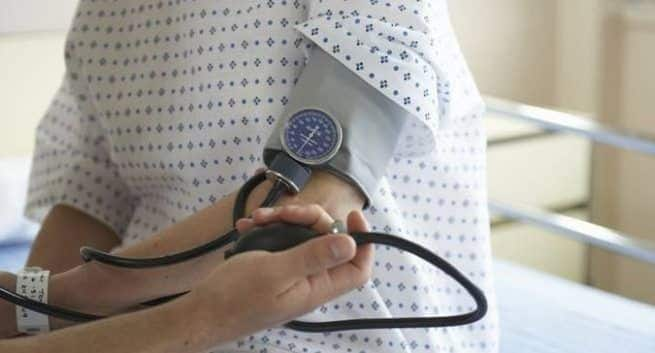
Blood pressure (hypertension) is the force of your blood against your artery walls. When you have your blood pressure checked the reading has two numbers; one on top and one on the bottom.
The top number is your Systolic Pressure. This is the force of your blood in your arteries when your heartbeats.
The bottom number is your Diastolic Pressure. This is the force of your blood in your arteries when your heart relaxes in-between beats.
According to a research presented (in 2018) at the 70th Annual Conference of the Cardiological Society of India (CSI), ‘one in every five young adults in India has hypertension.’ This total could be more than the entire UK’s population.
Experts believe that in India, hypertension screening starts a little late, after 30 years of age, and that’s perhaps adding to these numbers.
They also believe that the lifestyle changes—sedentary life and food high in salt—have put Indians at higher risk of diseases like high cholesterol, hypertension, and diabetes.
Other things that can put you at risk of having hypertension include:
1. Overweight
If you are overweight you are at an increased risk of developing high blood pressure. You might already know this and you might not.
If this is the case for you, consult your doctor and see what he might recommend for you. Losing at least ten pounds can significantly lower your blood pressure.
2. Tobacco and Alcohol
Using tobacco and alcohol raises your blood pressure. If you use either of these consider quitting.
If you are unable to quit right away, limit your consumption of alcohol and use of tobacco.
There are many over the counter and prescription products to help rid your self of these habits. Talk to your doctor about any concerns you might have.
3. Medical Conditions
Medical conditions also factor into high blood pressure along with your lifestyle. Kidney disease can result in high blood pressure as well as cause it.
Sleeping disorders that interrupt your breathing during sleep will also raise your blood pressure.
Talking with your doctor about your condition could benefit your disorder along with your blood pressure.
4. Too Much Salt Intake
Salt is a mineral composed primarily of sodium chloride, a chemical compound belonging to the larger class of salts; salt in its natural form as a crystalline mineral is known as rock salt or halite.
Salt is present in vast quantities in seawater, where it is the main mineral constituent
However, you’ve probably heard to watch the amount of salt you eat, especially if you’re concerned about your blood pressure.
That’s because it makes your body hold on to water, putting extra stress on your heart and blood vessels.
5. Lack or Inadequate Potassium
Potassium is a mineral and an electrolyte. It helps your muscles work, including the muscles that control your heartbeat and breathing.
Potassium comes from the food you eat. Your body uses the potassium it needs. The extra potassium that your body does not need is removed from your blood by your kidneys.
Your kidneys need a balance of sodium and potassium to keep the right amount of fluid in your blood.
So even if you’re eating a low-salt diet, you could still have higher blood pressure if you’re not also eating enough fruits, veggies, beans, low-fat dairy, or fish.
While you may think of bananas as the go-to source, broccoli, water chestnuts, spinach, and other leafy greens are better to get potassium if you’re watching your weight.
6. Medications and Drugs
Certain medications and drugs can also raise your blood pressure. Certain types of anti-depressants will do this as well as certain cold medicines.
Be aware of oral contraceptives, nasal decongestants, anorexia drugs and steroids.
These can possibly raise your blood pressure as well so talk with your doctor before taking any of them if you are concerned.
7. Loneliness
This isn’t just about the number of friends you have — it’s about feeling connected. And being stressed or depressed doesn’t fully explain the effect.
It also gets worse with time: Over 4 years, the upper blood pressure of the loneliest people in a study went up more than 14 points.
The researchers think an ongoing fear of rejection and disappointment and feeling more alert about your safety and security may change how your body works.
8. Prolonged Stress
Stress plays a huge factor in high blood pressure and unfortunately, everyone is stressed at some point in their lives.
If you deal with a high amount of stress, consider relaxation techniques. Do whatever you can that you know will calm you down and help relieve stress.
9. Unhealthy Diet
An unhealthy diet or lack of physical activity or exercise can also put you at risk for high blood pressure.
Try to exercise at least thirty minutes a day even if you have to space the time out. Eating less salt and more vegetables and fruits can help lower your blood pressure as well.
Try to incorporate this into your present diet and you will see the results rather quickly.
10. Pain
Pain is a distressing feeling often caused by intense or damaging stimuli.
The International Association for the Study of Pain’s widely used definition defines pain as “an unpleasant sensory and emotional experience associated with actual or potential tissue damage, or described in terms of such damage”.
Sudden, or acute, pain ramps up your nervous system and raises your blood pressure. You can see this effect when you put one hand in ice water, press on your cheek or fingernail, or get an electric shock to your finger.
Click here to read more about All Factors That Can Make You Have Hypertension
Wayforward
These factors mentioned double the risk of high blood pressure. While you can control most of the factors that raise your blood pressure there are some you cannot.
For instance your race; African Americans are more prone to high blood pressure, people over fifty-five are at a higher risk, and your family history can play a role in your blood pressure as well.
While you cannot control these factors you can easily try to help decrease your risk. Watch your diet, exercise, lifestyle habits, etc. Over time this may be very beneficial to you.
High blood pressure can cause strokes and even heart and kidney diseases. Leading a healthier lifestyle can help you live longer and enjoy your time in a healthy state. Talk with your doctor about any questions or concerns you may have concerning your blood pressure. It is never too late to take control.
You can also read about Uncommon Treatment That Can Improve Hypertension Faster








